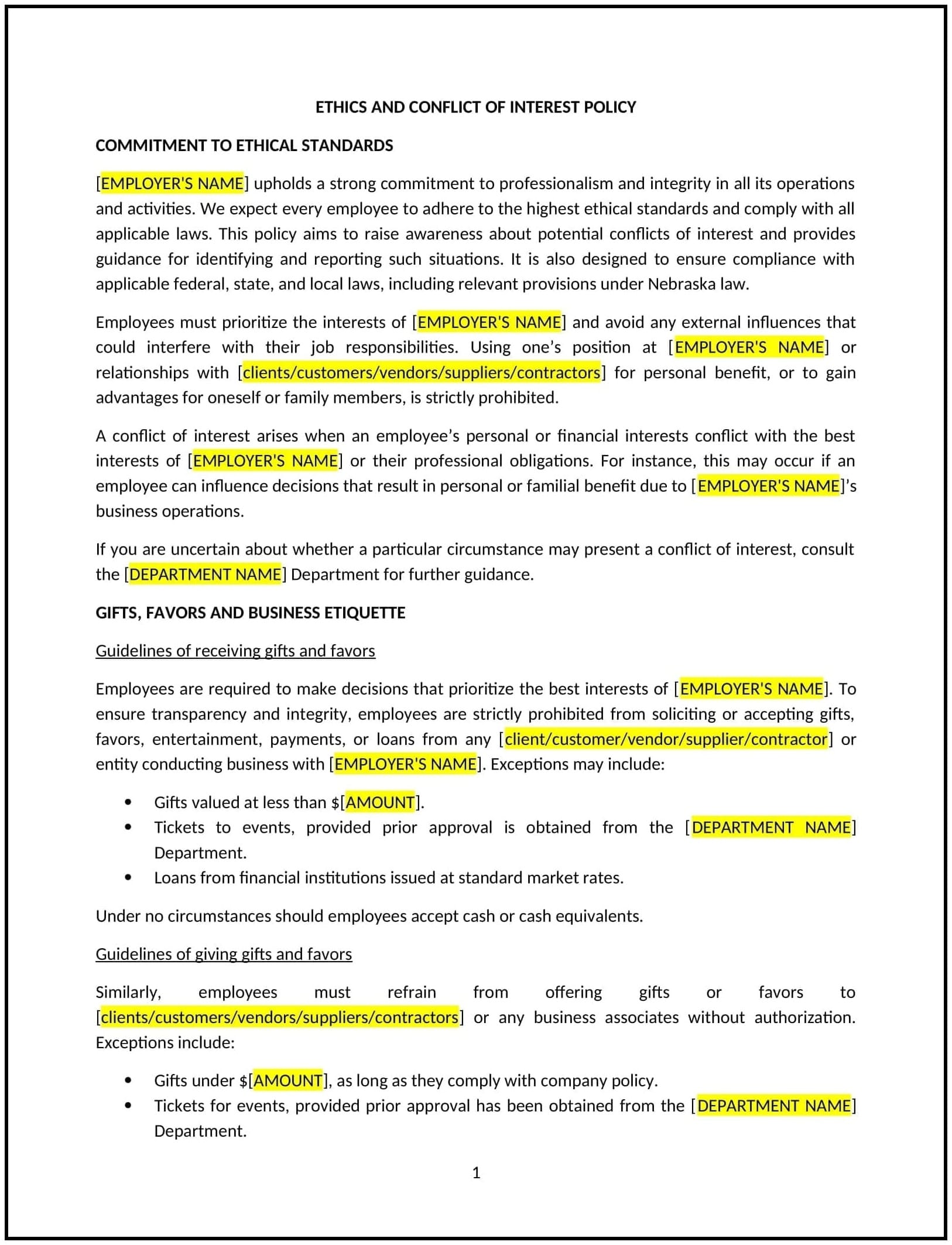Ethics and conflict of interest policy (Nebraska): Free template
Got contracts to review? While you're here for policies, let Cobrief make contract review effortless—start your free review now.

Customize this template for free
Ethics and conflict of interest policy (Nebraska)
An ethics and conflict of interest policy helps Nebraska businesses establish clear guidelines for ethical conduct and avoid conflicts of interest in business decisions. This policy outlines the standards for employee behavior, situations where conflicts of interest may arise, and the procedures for disclosing and addressing potential conflicts. It is designed to maintain the integrity of the business, protect the organization’s reputation, and ensure that decisions are made in the best interest of the company, free from personal bias or external influence.
By adopting this policy, businesses in Nebraska can foster a culture of honesty, transparency, and ethical decision-making, promoting trust among employees, clients, and stakeholders.
How to use this ethics and conflict of interest policy (Nebraska)
- Define ethical standards: Clearly outline the ethical expectations for employees, including honesty, integrity, fairness, and transparency. Specify the behavior that is expected in professional interactions and business decisions.
- Identify conflicts of interest: Define what constitutes a conflict of interest, including personal relationships, financial interests, or outside employment that could influence or appear to influence a business decision. Provide examples of potential conflicts that employees should be aware of.
- Establish disclosure procedures: Outline the process for employees to disclose any potential conflicts of interest. This may include completing a disclosure form, notifying their supervisor, or seeking guidance from the HR or legal department. Ensure employees know when and how to report a conflict.
- Address the handling of conflicts: Describe how conflicts of interest will be managed, including the steps the company will take to mitigate or eliminate the conflict, such as reassignment of duties, divestiture of conflicting interests, or other corrective actions.
- Set consequences for violations: Clearly outline the consequences of failing to disclose a conflict of interest or engaging in unethical behavior. This may include disciplinary action, termination, or legal action, depending on the severity of the violation.
- Promote transparency: Emphasize the importance of transparency in decision-making processes and encourage employees to report unethical behavior or potential conflicts without fear of retaliation.
- Review and update: Periodically review and update the policy to ensure it remains relevant and effective in addressing new ethical concerns, business changes, and Nebraska laws.
Benefits of using this ethics and conflict of interest policy (Nebraska)
This policy provides several benefits for Nebraska businesses:
- Maintains business integrity: By setting clear ethical guidelines and addressing conflicts of interest, businesses can maintain trust and transparency in all aspects of their operations.
- Reduces legal risks: A well-defined policy helps reduce the risk of legal disputes related to unethical behavior or conflicts of interest, protecting the company from potential lawsuits or regulatory penalties.
- Enhances company reputation: Companies known for their strong ethical standards and commitment to transparency build a positive reputation among clients, customers, employees, and the public.
- Promotes fair decision-making: A clear conflict of interest policy ensures that decisions are made based on merit and the best interests of the business, rather than personal interests or biases.
- Encourages a positive workplace culture: Employees who feel confident that ethical standards are upheld and conflicts of interest are addressed are more likely to feel respected and motivated in their roles.
Tips for using this ethics and conflict of interest policy (Nebraska)
- Communicate the policy clearly: Ensure all employees understand the ethical standards and the procedures for disclosing conflicts of interest. Make the policy accessible and part of the onboarding process for new hires.
- Provide training: Offer regular training on ethics, conflict of interest issues, and how to identify and report potential conflicts. Encourage employees to seek guidance when they are unsure about a situation.
- Monitor compliance: Regularly review employee disclosures and monitor business decisions to ensure that conflicts of interest are properly managed and that ethical standards are being upheld.
- Promote a culture of openness: Encourage employees to speak up if they suspect unethical behavior or conflicts of interest, and ensure they know that their concerns will be taken seriously and investigated appropriately.
- Review and update regularly: Keep the policy up-to-date by reviewing it periodically, especially when there are changes in company practices, state laws, or federal regulations related to ethics and conflicts of interest.